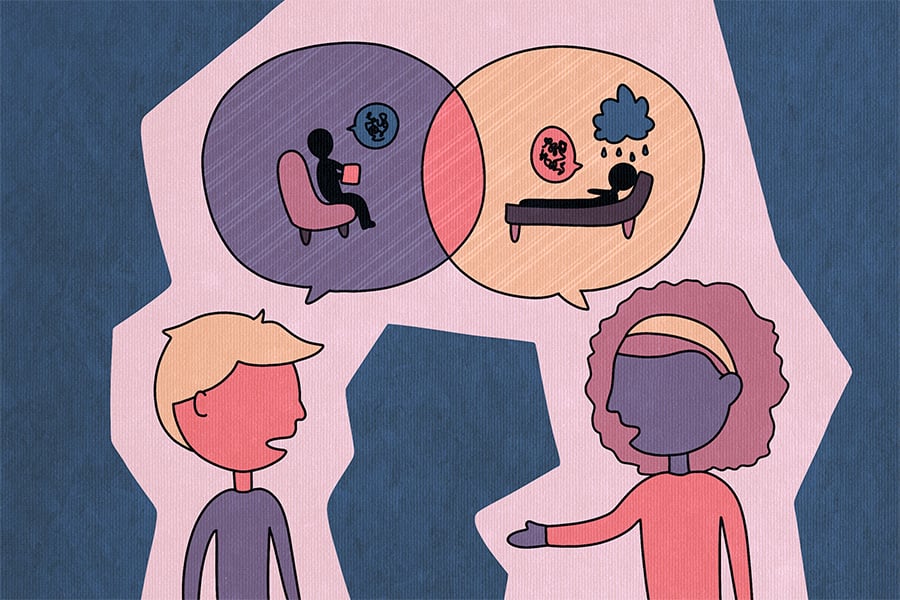In response to limited CAPS availability, students compile local therapist recommendations
Students have compiled Evanston-area therapist recommendations for one another among limited openings at the Counseling and Psychological Services.
May 6, 2021
When Weinberg junior Alex Turntine reached out to Counseling and Psychological Services in the winter, she was put on a waitlist because the center did not staff any specialists who could address her needs.
While CAPS gave her multiple therapist recommendations in the Evanston and Chicago area, Turntine said most of the locations had unaffordable out-of-pocket costs. She set out to find a therapist herself.
“I just didn’t know where to start,” Turntine said. “I also just don’t have it in me to go six months with a therapist to realize that they’re not a good fit, especially because this is a critical time, with school and the pandemic.”
Overwhelmed by the task, Turntine turned to Twitter to ask other NU students for therapist recommendations, she said. When others messaged her asking to pass along the information, Turntine compiled a document of all the recommendations she received.
Weinberg junior Madison McReynolds also shared a list on Twitter of Evanston-area therapist recommendations, which she had compiled from her own research. Her spreadsheet was organized by specialty and accepted insurance, she said.
McReynolds said she hoped to help students like her, who have put off seeking help because the search for mental health resources can feel daunting.
“You don’t want to wait until (your mental health) is something that you can’t ignore,” she said. “My thinking was to just make this openly sourced document, and maybe it would help one or two people, and that would be really cool.”
When she began looking for a therapist last year, McReynolds said she did not consider CAPS as an option. She said she had heard from students about the center’s history of inconvenient wait times and inconsistency.
In a 2020 Associated Student Government survey, almost half of the students who consulted CAPS reported that the treatment led to an outside referral. The survey also found that 22.04% of these students did not follow through on an initial consultation or treatment because the wait times were too long.
A freshman international student who asked to remain anonymous said they started meeting with a CAPS counselor during Fall Quarter, but had the sessions end in March because CAPS only offers short-term individual treatment.
They found most of the therapist referrals from CAPS were booked. It took them almost two months to book an appointment in Evanston, they said, and the therapist did not fulfill their needs as an international, BIPOC student.
“It was this White psychiatrist who just mocked my experiences, implying that they weren’t such a big deal,” they said. “So if you’re a person of color who is trying to look for someone who you can empathize with, who you can feel comfortable with — which is the purpose of therapy — it’s even harder.”
The search for another therapist has been particularly difficult because they have limited knowledge of how to navigate the American healthcare system as an international student, they said.
Turntine said after a phone call and email exchange with a CAPS specialist, their top recommendation was entirely unfeasible with her work schedule and budget.
“All of us are in a pandemic, and so many people are leaving home for the first time,” she said. “To invite students back to campus, I really expected, rightfully, that they should be prepared for more students to be seeking mental health care.”
The therapist search was much easier for her after consulting with others who had been through the process, Turntine added.
Around 20 people sent her recommendations on social media, she said, and some even chimed in with additional information after she published her list. She removed one practice from the list because a student told her they had experienced anti-Black rhetoric there, Turntine said.
“It really helps to speak to other students in the same boat,” she said. “It can be embarrassing or intimidating, but there’s so many of us who are really struggling right now to find the help that we need.”
Email: [email protected]
Twitter: @maiapandey
Related Stories:
— Garrett Gilmer starts as new executive director of CAPS, talks inclusion
— A year into the pandemic, students reflect on how life over Zoom has impacted mental health, social lives
— From mutual followers to real-life friends: Northwestern students find community on Twitter


